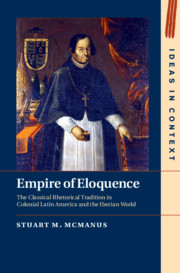Refine search
Actions for selected content:
2 results

Empire of Eloquence
- The Classical Rhetorical Tradition in Colonial Latin America and the Iberian World
-
- Published online:
- 09 April 2021
- Print publication:
- 08 April 2021
Chapter 4 - Indo-Humanist Eloquence
-
- Book:
- Empire of Eloquence
- Published online:
- 09 April 2021
- Print publication:
- 08 April 2021, pp 155-189
-
- Chapter
- Export citation
